Living Society

What are the advantages and disadvantages of living in a multicultural society ?
Advantages and Disadvantages of Living in a Multicultural Society The advantages of living in a multicultural society include cultural diversity, enhanced understanding and tolerance, economic benefits, language learning, and social inclusivity. These benefits enrich daily life by exposing individuals to different ways of thinking, art forms, cuisines, and festivals, fostering greater understanding and acceptance of others, attracting a skilled global workforce, providing natural opportunities to learn new languages, and promoting better access to education, healthcare, and other social services for all members of the community. However, living in a multicultural society also has its disadvantages, such as cultural conflict, integration challenges, identity confusion, potential for segregation, and policy challenges. Differences in cultural values and norms can sometimes lead to misunderstandings and conflicts, newcomers might face challenges integrating into the mainstream culture, individuals may struggle with their sense of identity, communities might form based on shared ethnicity or language reducing interaction between different groups, and managing a multicultural society requires complex policy-making to address the needs of diverse populations. Overall, living in a multicultural society requires thoughtful management and open-mindedness to navigate the complexities of diverse populations successfully while enjoying the benefits it brings.

What are the positive effects of celebrity influence on society ?
Celebrities wield significant influence that extends beyond their areas of expertise, and this influence can have both positive and negative impacts on society. The positive effects include raising awareness on important issues, promoting education, cultural exchange, economic growth, sustainable living, fashion trends, and driving social change through activism. Celebrities can use their platforms to bring attention to global concerns, promote healthy lifestyles, encourage mental health discussions, support literacy programs, inspire STEM pursuits, showcase cultural diversity, boost local businesses, foster entrepreneurship, advocate for eco-friendly practices, diversify beauty standards, engage in political conversations, and strengthen community bonds. However, with great influence comes great responsibility; celebrities should strive to use their platform thoughtfully and constructively for the betterment of society.

How do inclusive policies benefit society as a whole ?
Inclusive policies are designed to promote equality, fairness, and social cohesion by eliminating barriers and discrimination. These policies benefit society as a whole by ensuring equal access to resources, services, and opportunities for all individuals regardless of their background, abilities, or circumstances. In addition to promoting equality and fairness, inclusive policies also enhance social cohesion by fostering a sense of belonging and mutual respect among different groups within society. This leads to reduced discrimination, increased tolerance, and strengthened community bonds. Inclusive policies also have positive economic outcomes by expanding the talent pool, reducing poverty, and stimulating consumer spending. Furthermore, these policies foster innovation and creativity by providing diverse perspectives, encouraging risk-taking, and promoting collaboration. Finally, inclusive policies can enhance a country's global competitiveness by attracting talent, improving international relations, and driving economic growth.

How do economic indicators reflect the standard of living in a country ?
Economic indicators such as GDP, income distribution, employment rates, healthcare and education spending, housing affordability, and inflation rates are used to gauge the standard of living in a country. These metrics provide insights into economic performance and health, reflecting aspects like access to education, healthcare, housing, employment opportunities, and consumer goods. A higher GDP per capita, lower Gini coefficient values, higher employment rates, greater healthcare and education spending, affordable housing, and stable or low inflation rates generally indicate a better standard of living. However, these indicators should be considered collectively for a comprehensive understanding of the economic conditions that influence citizens' lives.
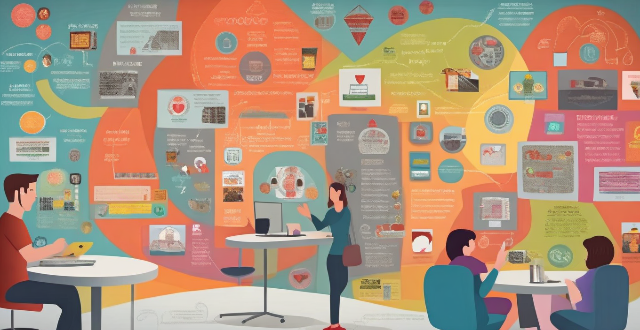
What are the challenges of living in a multicultural society and how can they be overcome ?
Living in a multicultural society presents challenges like language barriers, cultural differences, and social isolation. Overcoming these involves strategies such as education, celebrating diversity, fostering inclusivity, building intercultural competence, and supporting identity development.

How can we promote diversity and inclusion in a multicultural society ?
This topic discusses strategies to promote diversity and inclusion in a multicultural society, including education, legislation, community engagement, media representation, business leadership, and personal actions.

How do smart home gadgets enhance the experience of elderly living alone ?
Smart home gadgets offer numerous benefits for elderly individuals living alone, including improved safety and security, increased independence and convenience, better health management, and enhanced social interaction. These devices can help address concerns such as access control, unusual activity detection, task assistance, automatic lighting, floor cleaning, vital sign monitoring, weight tracking, medication reminders, video calling, social media engagement, and entertainment streaming services. As technology advances further, we can expect more innovative solutions tailored specifically to the needs of elderly individuals living alone.

Can you explain the concept of a living building in the context of ecological design ?
The text introduces the concept of a "living building" in ecological design, emphasizing sustainable materials, energy efficiency, and water conservation. It outlines key features such as using renewable and non-toxic materials, maximizing natural light and ventilation, and promoting biodiversity through green spaces. Benefits include reduced environmental impact, long-term economic savings, improved health for occupants, and enhanced social interaction. The text concludes that living buildings offer significant advantages for people and the planet, suggesting their increasing importance in future built environments.
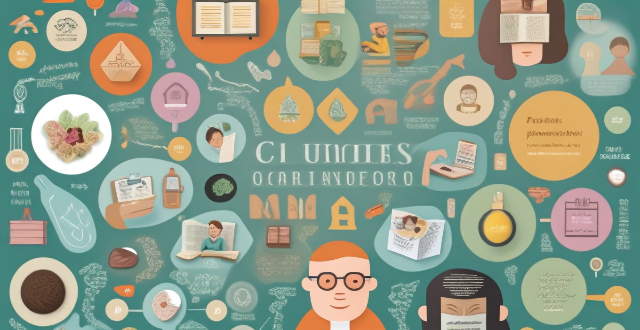
What are the benefits of social inclusion for individuals and society as a whole ?
Social inclusion benefits individuals and society by promoting equality, diversity, and participation. Individuals experience enhanced quality of life, greater opportunities, improved mental health, increased self-esteem, and strengthened social support networks. Society benefits from economic growth, reduced poverty and inequality, improved public services, enhanced social cohesion, increased civic engagement, promotion of human rights, a positive global image, and intergenerational equity.
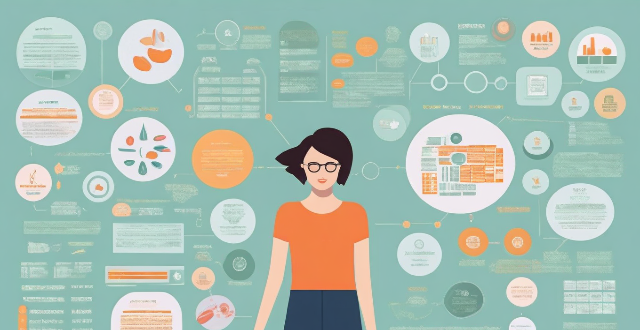
What are the long-term effects of poor immigrant integration on society ?
This article discusses the long-term effects of poor immigrant integration on society, including social exclusion, economic consequences, and cultural impacts such as loss of cultural heritage and increased tensions between ethnic groups. It emphasizes the importance of prioritizing immigrant integration efforts to ensure that immigrants are fully included in all aspects of society.
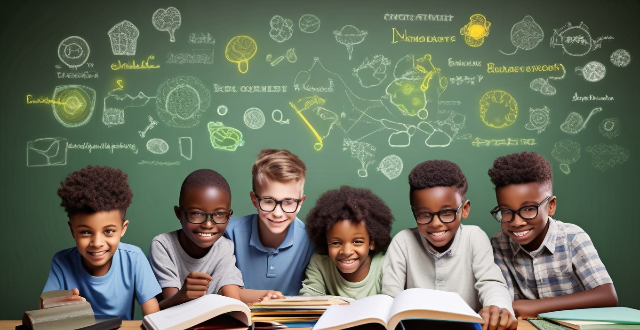
How does a multicultural society impact the education system ?
In a multicultural society, the education system is influenced in various ways. One of the most obvious impacts is diversity in classrooms which can enrich the learning environment and help students develop empathy and understanding for people who are different from themselves. The curriculum may need to be adapted or changed to accommodate the needs of a diverse student population. Language barriers can also be a challenge for both students and teachers. Educators need to be culturally sensitive and aware of the diverse backgrounds of their students. Parental involvement in education can be complex in a multicultural society. By embracing diversity in the classroom, the education system can create an inclusive and enriching learning environment for all students.

How does regular exercise impact the social well-being of seniors living alone ?
Regular exercise is crucial for enhancing the social well-being of seniors living alone, as it improves mood and mental health, increases social interaction, enhances cognitive function, and reduces the risk of chronic diseases. Engaging in regular exercise can help seniors maintain their independence and improve their overall quality of life.

What is the difference between a living will and a durable power of attorney ?
Living wills and durable powers of attorney (DPAs) are vital estate planning tools with distinct purposes. A living will outlines medical treatment preferences, becoming effective only under specific health conditions, while a DPA grants broad financial and legal authority to an agent, typically effective immediately and continuing through incapacity. Both documents can be revoked by the creator if mentally competent but function differently upon incapacity. It is crucial to consult with an estate planning attorney for proper execution according to state laws.

How can we celebrate and embrace cultural differences in a multicultural society ?
In a multicultural society, celebrating and embracing cultural differences is crucial for fostering understanding, respect, and harmony. To achieve this, it's important to educate oneself and others about different cultures, participate in cultural events, promote diversity in media and entertainment, advocate for inclusivity in education and workplaces, engage in open dialogue, practice empathy and active listening. These strategies can help create a more inclusive and harmonious multicultural society where everyone feels valued and respected for their unique cultural contributions.

In what ways does education empower women socially and politically ?
Education is crucial for women's empowerment, enabling them to challenge societal norms and contribute more fully to society. It fosters increased awareness, improved socioeconomic status, and enhanced social relationships. Education also leads to greater political participation, policy influence, and promotion of gender equality. Overall, education enriches society by improving the lives of women and contributing to a more equitable world.
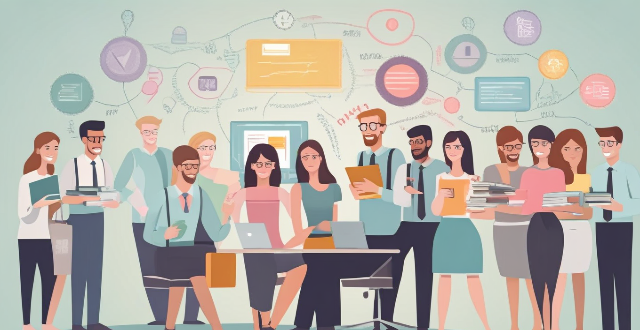
How do international students contribute to the host country's economy and society ?
International students significantly contribute to their host countries' economy and society through tuition payments, consumer spending, workforce participation, entrepreneurship, cultural exchanges, educational enrichment, global networking, and community engagement. However, challenges such as integration efforts and sustainable policies must be considered to maximize these benefits.
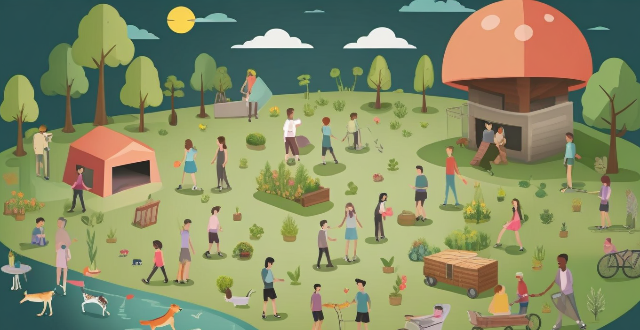
What is a multicultural society and how does it benefit individuals and communities ?
A multicultural society is an environment where people from diverse cultural backgrounds coexist, sharing and respecting each other's beliefs, traditions, and practices. It benefits individuals by enhancing their cultural awareness, promoting personal growth, and providing career opportunities. For communities, it promotes social cohesion, economic prosperity, cultural exchange, and improved public services. Overall, multicultural societies create a more harmonious and prosperous world for all.

What are the psychological and social impacts of living in a world affected by global warming ?
Living in a world affected by global warming can have significant psychological and social impacts on individuals and communities, including increased stress and anxiety, changes in mood and emotional well-being, cognitive effects, changes in social dynamics, impacts on mental health services, and societal responses such as adaptation and collective action. These impacts highlight the urgent need for action to address climate change and support the well-being of those affected by its consequences.

How does scientific literacy among women impact society ?
Scientific literacy among women has significant benefits for society, including improved health outcomes, increased economic opportunities, enhanced environmental stewardship, greater participation in policy decisions, and promotion of gender equality. However, challenges such as lack of access to quality education, gender biases in STEM fields, limited role models, and workplace discrimination must be addressed to fully realize these benefits.

How do low-income countries tackle poverty and improve the living standards of their population ?
Tackling poverty in low-income countries requires a multifaceted approach that addresses various aspects of development. Some key strategies include investing in education, promoting economic growth through foreign investment and local industry development, addressing healthcare needs by providing access to primary care services and training healthcare workers, and empowering women and girls through education, gender equality initiatives, and support for women-led businesses. By adopting these approaches, low-income countries can work towards improving the living standards of their populations and breaking the cycle of poverty.

How can writers use sports as a metaphor for larger societal issues ?
The text provides a guide on how writers can use sports as a metaphor to explore larger societal issues. The playing field in sports is likened to a microcosm of society, where fairness, equality, and justice are examined. Teamwork and collaboration in sports are used to discuss cooperation, diversity, and inclusion in society. The competitive nature of sports serves as a metaphor for the drive for success, ambition, perseverance, and the cost of success. Rules and ethics in sports are compared to societal laws and ethical standards, discussing corruption, cheating, and the importance of maintaining integrity. Finally, overcoming adversity in sports is used as a platform for stories of hope and resilience in the face of societal challenges.

How do smart living gadgets contribute to energy efficiency in homes ?
Smart living gadgets play a significant role in enhancing energy efficiency in homes. They automate and optimize household operations, resulting in reduced energy consumption and lower utility bills. Smart thermostats allow remote control of heating and cooling systems, while smart light bulbs can be controlled remotely and set to turn on/off automatically. Smart plugs and power strips monitor and control power consumption of appliances, reducing standby power waste. Smart water heaters optimize hot water production based on demand, reducing unnecessary energy consumption. Adopting these devices can help homeowners reduce energy consumption, lower utility bills, and contribute to a more sustainable future.
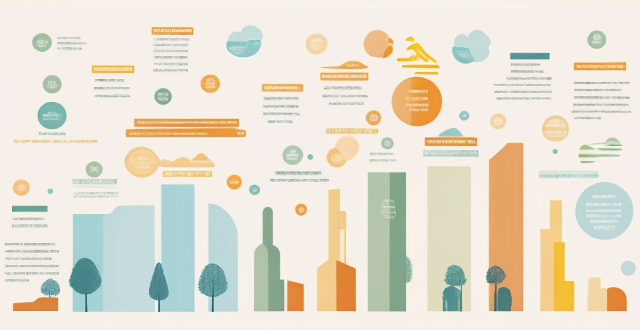
How does tax planning affect a country's economy ?
Tax planning is a crucial component of any country's fiscal policy, as it affects various aspects of the economy, including government spending, investment decisions, and consumer behavior. Increased tax revenue can lead to higher government spending in critical sectors like healthcare and education, which can improve living standards and stimulate economic growth. Tax incentives can encourage businesses to invest in areas aligned with economic objectives, leading to job creation and technological advancements. Additionally, tax planning can influence consumer behavior by affecting prices, discouraging consumption of certain products, and promoting responsible spending habits. Overall, effective tax planning is essential for fostering economic growth, enhancing living standards, and promoting sustainable development.
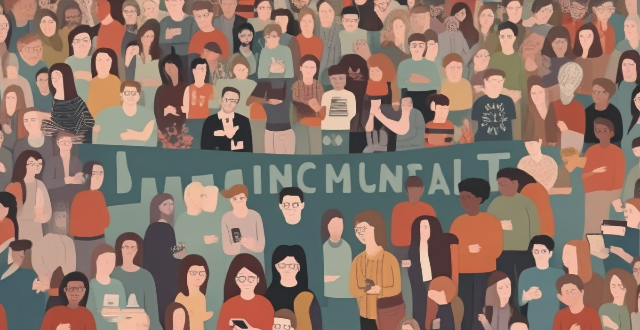
What role does education play in helping immigrants integrate into society ?
Education is crucial for immigrants' integration into society, providing language skills, cultural understanding, access to opportunities, and social networking.

What are the long-term effects of educating girls on society ?
The long-term effects of educating girls are numerous and far-reaching. They include improved health outcomes, economic growth, gender equality, and social change. Educated women are more likely to seek prenatal care, give birth in a medical facility, and utilize family planning methods, leading to a reduction in maternal mortality rates and infant mortality rates. Additionally, educated women are more likely to participate in the labor force, start their own businesses, and earn higher wages, leading to economic growth. Educating girls also promotes gender equality by challenging traditional gender roles and demanding equal treatment in all aspects of life. Finally, educating girls can lead to social change by breaking the cycle of poverty and promoting policies that benefit all members of society.

How does cultural fusion affect society's development ?
Cultural fusion is the process whereby different cultures influence each other over time. This phenomenon can have a significant impact on society's development in various ways. In this article, we will explore how cultural fusion affects society's development and discuss some examples of its effects. One of the most obvious benefits of cultural fusion is that it enhances diversity within a society. When different cultures come together, they bring with them unique perspectives, traditions, and values that can enrich the overall culture. This can lead to increased creativity, innovation, and social progress. Another benefit of cultural fusion is that it promotes tolerance and understanding among people from different backgrounds. By learning about and experiencing other cultures, individuals become more open-minded and accepting of differences. This can help to reduce prejudice, discrimination, and conflict within society. Cultural fusion also plays a crucial role in facilitating globalization. As cultures interact and exchange ideas, goods, and services, they become more interconnected and interdependent. This can lead to increased economic growth, trade opportunities, and international cooperation. While cultural fusion can bring many benefits to society, it also presents some challenges that must be addressed. These include loss of cultural identity, erosion of cultural heritage, and cultural imperialism. There are many examples of cultural fusion throughout history and around the world today. Some notable examples include food culture, music culture, and fashion culture.

What are the health risks associated with living near a communication base station ?
Living near a communication base station, such as a cell tower or a radio mast, has raised concerns about potential health risks. While the scientific evidence is still being debated, there are several possible health effects that have been suggested by some studies and expert opinions. Here are some of the key health risks associated with living near a communication base station: - Electromagnetic Radiation Exposure: Increased exposure to electromagnetic fields (EMFs) and possible long-term effects on health. - Sleep Disruption: Disrupted sleep patterns and chronic sleep deprivation leading to various health issues. - Stress and Anxiety: Heightened stress levels and mental health impacts due to concerns about EMF exposure. - Environmental Impact: Noise pollution and visual pollution affecting both human health and wildlife.

What are some good habits for green living while traveling ?
Adopting eco-friendly habits while traveling can help reduce your carbon footprint and contribute to sustainable tourism. Here are some good habits for green living while traveling: 1. Plan ahead by researching local recycling facilities, public transportation options, and eco-friendly accommodations. 2. Choose eco-friendly accommodations with energy-efficient lighting, water-saving showerheads, and recycling programs. 3. Use public transportation instead of renting a car or taking taxis to reduce greenhouse gas emissions and save money on transportation costs. 4. Bring reusable items such as water bottles, shopping bags, and utensils to reduce plastic waste while traveling. 5. Support local businesses by eating at locally owned restaurants, shopping at farmers' markets, and purchasing souvenirs made by local artisans. 6. Choose sustainable tourism activities that promote conservation and responsible tourism, such as guided nature walks and wildlife safaris. 7. Respect wildlife and nature by staying on designated trails, not littering, and not disturbing animals. 8. Save energy and water by turning off lights and electronics when not in use, taking shorter showers, and using energy-efficient appliances if available.